The United Nations Conference on Trade and Development (UNCTAD) annual Trade and Development Report 2022 projects global growth of 2.5% in 2022 slowing to 2.2% in 2023 and outlines actions to avert crisis and support developing countries
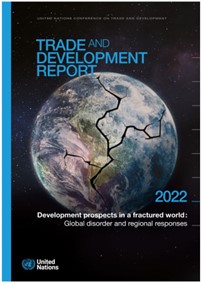 Correction: The figure $3.6 trillion in the first paragraph on page 2 of this press release, has been corrected to $360 billion.
Correction: The figure $3.6 trillion in the first paragraph on page 2 of this press release, has been corrected to $360 billion.
Monetary and fiscal policy moves in advanced economies risk pushing the world towards global recession and prolonged stagnation, inflicting worse damage than the financial crisis in 2008 and the COVID-19 shock in 2020, the UN Conference on Trade and Development (UNCTAD) warns today in its Trade and Development Report 2022.
According to the report, rapid interest rate increases and fiscal tightening in advanced economies combined with the cascading crises resulting from the COVID pandemic and the war in Ukraine have already turned a global slowdown into a downturn with the desired soft landing looking unlikely.
In a decade of ultra-low interest rates, central banks consistently fell short of inflation targets and failed to generate healthier economic growth. Any belief that they will be able to bring down prices by relying on higher interest rates without generating a recession is, the report suggests, an imprudent gamble.
At a time of falling real wages, fiscal tightening, financial turbulence and insufficient multilateral support and coordination, excessive monetary tightening could usher in a period of stagnation and economic instability for many developing countries and some developed ones.
This year’s interest rate hikes in the United States are set to cut an estimated $360 billion of future income for developing countries (excluding China) and signal even more trouble ahead, the report warns.
“There’s still time to step back from the edge of recession,” UNCTAD Secretary-General Rebeca Grynspan said. “We have the tools to calm inflation and support all vulnerable groups. This is a matter of policy choices and political will. But the current course of action is hurting the most vulnerable, especially in developing countries and risks tipping the world into a global recession.”
A synchronized slowdown in the global economy affecting all regions
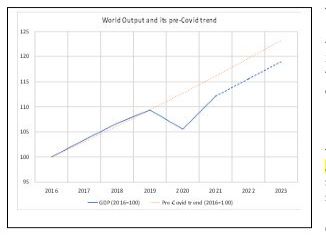 UNCTAD expects the world economy to grow 2.5% in 2022 (see table 1.1). Prospects are worsening, with growth in 2023 expected to decelerate further to 2.2%, leaving real GDP still below its pre-pandemic trend by the end of next year and a cumulative shortfall of more than $17 trillion -- close to 20% of the world’s income.
UNCTAD expects the world economy to grow 2.5% in 2022 (see table 1.1). Prospects are worsening, with growth in 2023 expected to decelerate further to 2.2%, leaving real GDP still below its pre-pandemic trend by the end of next year and a cumulative shortfall of more than $17 trillion -- close to 20% of the world’s income.
The synchronised slowdown is hitting all regions but is ringing alarm bells for developing countries, where the average growth rate is projected to drop below 3%, a pace insufficient for sustainable development, further squeezing public and private finances and damaging employment prospects.
Middle-income countries in Latin America, as well as low-income countries in Africa, will register some of the sharpest slowdowns this year (see regional press releases). The report notes that countries that were showing signs of debt distress before Covid are taking some of the biggest hits (Zambia, Suriname, Sri Lanka) with climate shocks further threatening economic stability (Pakistan).
Addressing alarming levels of debt distress and under-investment
Net capital flows to developing countries have turned negative with the deterioration of financial conditions since the last quarter of 2021, the report says. On net, developing countries are now financing developed ones.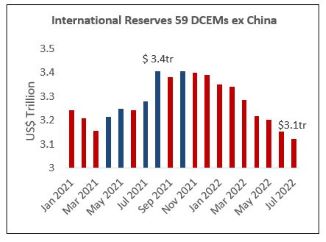
Some 90 developing countries have seen their currencies weaken against the dollar this year – over a third of them by more than 10%; foreign exchange reserves are falling and bond spreads are widening, with a growing number posting yields 10 percentage points higher than US treasuries.
Currently, 46 developing countries are severely exposed to multiple economic shocks and another 48 seriously exposed, heightening the threat of a global debt crisis.
The report concludes the situation in developing countries is much more tenuous than recognized by the G20 and other international financial fora, with talk of a global financial safety net increasingly at odds with their reality. Developing countries have already spent an estimated $379 billion of reserves to defend their currencies this year, almost double the amount of new Special Drawing Rights (SDRs) recently allocated to them by the International Monetary Fund, and have also suffered significant impact from capital flight.
UNCTAD calls for the increasing of Official Development Assistance (ODA), a larger, more permanent, and fairer use of SDRs, hedging mechanisms to deal with exchange-rate volatility, and greater leveraging of multilateral capital to support developing countries with comprehensive social programmes. But additionally, progress on a multilateral legal framework for handling debt restructuring, including all official and private creditors, should be made a priority.
The report recommends a programme of reforms in developing economies to boost productive investment and constrain capital moving to exploit tax loopholes, along with new arrangements to support closer regional trade, investment and financial ties.
Monetary tightening. An urgent call for course correction
Compared to the global financial crisis, the COVID-19 recovery has been more inflationary for advanced economies than for developing countries, where inflation rates are structurally higher.
In developed countries, inflation has been mostly driven by commodity prices – especially energy – and persistent bottlenecks in supply chains, with roots in the insufficient investment since the global financial crisis. Inflation measures that exclude energy are considerably lower than consumer price inflation.
In man y developing countries, inflation has been largely driven by energy prices and exchange rate depreciation, which has made imports more expensive.
y developing countries, inflation has been largely driven by energy prices and exchange rate depreciation, which has made imports more expensive.
Large multinational corporations with considerable market power appear to have taken undue advantage of the current context, raising markups to boost profits.
Under these circumstances, the report says, harking back to the 1970s or to later decades marked by austerity policies in response to today’s challenges is a dangerous gamble.
“The real problem facing policy makers is not an inflation crisis caused by too much money chasing too few goods, but a distributional crisis with too many firms paying too high dividends, too many people struggling from paycheck to paycheck and too many governments surviving from bond payment to bond payment,” said Richard Kozul-Wright, head of the team in charge of the report.
With inflation already beginning to ease in advanced economies, UNCTAD calls for a course correction in favour of policy measures targeting price spikes in energy, food, and other vital areas directly.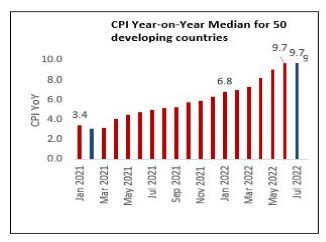
The Black Sea Grain Initiative led by the United Nations has had a significant impact in lowering food prices - the FAO Food Price Index declined for a fifth consecutive month to 138 in August 2022, reaching the lowest level in seven months, due to a broad-based fall in food cost. Cereal prices went down 1.4%, led by a 5.1% drop in international wheat prices linked to the resumption of exports from the Black Sea ports in Ukraine for the first time in over five months of interruption.
Nevertheless, the report underlines the need for increased support for vulnerable groups, including lower-wage workers and households in financial distress, warning of the damage that monetary tightening is causing to economic, social and climate goals, hitting the poorest the hardest.
UNCTAD urges a more pragmatic strategy that deploys strategic price controls, windfall taxes, anti-trust measures and tighter regulations on commodity speculation.
Ending commodity price speculation
 Commodity prices climbed for much of the last two years, with costlier food and energy posing significant challenges for households everywhere. Added upward pressure on fertilizer prices means the damage could be lasting.
Commodity prices climbed for much of the last two years, with costlier food and energy posing significant challenges for households everywhere. Added upward pressure on fertilizer prices means the damage could be lasting.
The war in Ukraine has contributed to this situation but commodity markets have been in a turbulent state for a decade. Insufficient attention has, according to the report, been paid to the role of speculators and betting frenzies triggered by their oversized footprint in futures contracts, commodity swaps and exchange traded funds.
The report outlines better regulation (some promised after the global financial crisis) and calls for windfall taxes to be part of the policy mix governments deploy to curb price spikes that hit consumers in the developing world hard, pushing hundreds of millions of people back into extreme poverty as corporations reap record profits.
Reclaiming the future
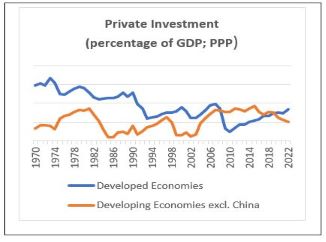 According to the report, the multiple crises the global economy currently faces are connected by a policy agenda that has failed on its major promises to deliver economic stability and boost productive investment, both public and private.
According to the report, the multiple crises the global economy currently faces are connected by a policy agenda that has failed on its major promises to deliver economic stability and boost productive investment, both public and private.
With the warning signs flashing across a range of economic and environmental indicators, reclaiming the future with innovative, ambitious policies, political will and private and public support is a prerequisite for achieving ambitious development goals, it says. The report lays out a strategy of increased cooperation among developing countries which, along with reforms to the multilateral architecture, could help shift the global economy in the right direction.
----------------------------------
About UNCTAD
UNCTAD is the UN’s leading institution dealing with trade and development. It is a permanent intergovernmental body established by the United Nations General Assembly in 1964.
UNCTAD is part of the UN Secretariat and has a membership of 195 countries, one of the largest in the UN system. UNCTAD supports developing countries to access the benefits of a globalized economy more fairly and effectively.
We provide economic and trade analysis, facilitate consensus-building and offer technical assistance to help developing countries use trade, investment, finance and technology for inclusive and sustainable development.
----------------------------------



